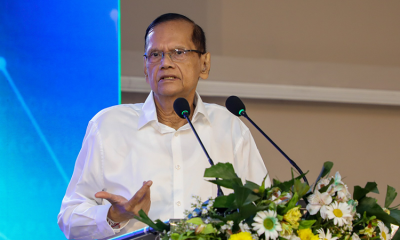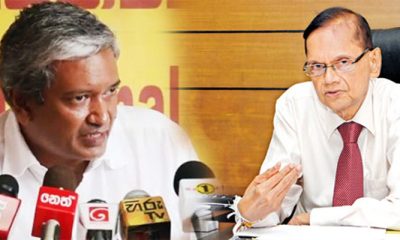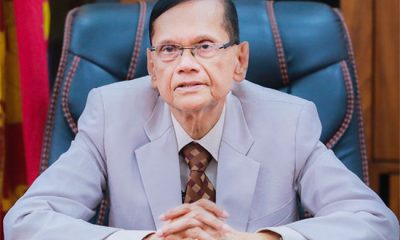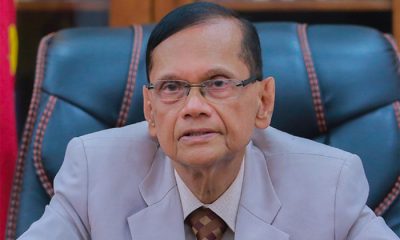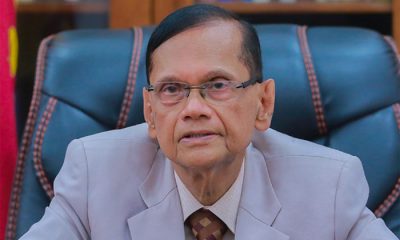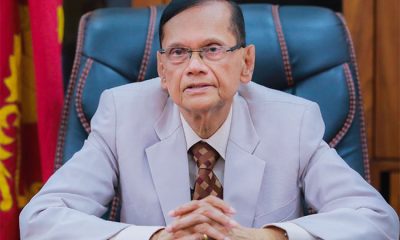News
SLT Mobitel offered same service at USD 1 per person but VFS charges USD 25 plus – SJB
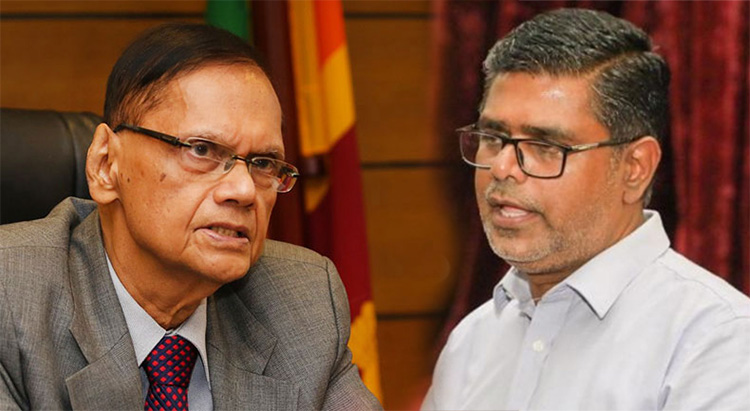
On-arrival visa controversy:
By Shamindra Ferdinando
The SJB has called upon the government to explain why the Department of Immigration and Emigration had entered into an agreement with VFS Global-led grouping for the issuance of online visas against the backdrop of SLT Mobitel offering the same service at a much lower cost.
Prof. G. L. Peiris, MP, and former SJB MP Mujibur Rahuman said that SLT Mobitel offered to issue an online visa per person at USD 1 whereas VFS-led operation charged USD 25.70 per person.
The disclosure was made at a media briefing held on Monday at the Opposition Leader’s Office at Sir Marcus Fernando Mawatha.
Prof. Peiris and Rahuman demanded that the Wickremesinghe-Rajapaksa government come clean on the issue.
Dissident SLPP MP Prof. Peiris recently aligned himself with the main Opposition SJB.
The Department of Immigration and Emigration recently finalised a tripartite agreement with GBS Technology Services and IVS Global FZCO being the prime contractor and VFS Global being the technology partner for the Sri Lanka government’s new E-Visa solution.
Referring to an expert evaluation of the controversial deal submitted to the Cabinet of Ministers, Prof. Peiris emphasised that the government had outsourced the vital function that shouldn’t have been removed from the Department of Immigration and Emigration, under any circumstances, contrary to the report submitted by its own committee, headed by T. V. D. Damayanthi S. Karunaratne, the Additional Secretary of the Ministry of Public Security.
The committee included Director General, Emigration and Immigration I.S.H.J. Ilukpitiya, Senior Assistant Secretary, Ministry of Public Administration, Home Affairs, Provincial and Local Government Champika Ramawickrema, Chief Financial Officer, Ministry of Public Security Ms. M. P. D. P. Pathirana and Additional Director General representing the Treasury M. R. G .A. Muthukuda.
They questioned the rationale in outsourcing responsibilities of the Department of Immigration and Emigration in the absence of serious shortcomings on their part. They insisted that Public Security Minister Tiran Alles should take responsibility for the situation. Minister Alles has denied any wrongdoing on his part or that of his Ministry. The SLPP National List MP claims both Parliament and Cabinet approved the project.
Former MP Rahuman asked whether Attorney General Sanjay Rajaratnam, PC, sanctioned the outsourcing of the Department of Immigration and Emigration functions.
At the onset of the briefing Prof. Peiris alleged that the latest deal was as corrupt as the February 2015 Treasury bond scams. Claiming that the Treasury bond scams had been perpetrated to fund the general election later that year, Prof. Peiris asked whether the incumbent government was in the process of raising funds for the forthcoming presidential poll.
The former Law Professor said that there hadn’t been any requirement, whatsoever, to involve an external party in operations performed by the Department of Immigration and Emigration.
Prof. Peiris emphasized that the USD 25.70 charged by the service provider is in addition to the visa fee received by the government. Pointing out that citizens of several countries, including India, China and Russia had been exempted from visa fees, Prof. Peiris said that they, too, were fleeced by the online visa provider to the tune of USD 25.70.
Alleging that the whole exercise was meant to benefit VFS Global led grouping and its local agents, Prof. Peiris warned that tourism could suffer quite a serious setback. “This could discourage tourists. The government cannot be unaware of the consequences, especially against the backdrop of Tourism Minister Harin Fernando disowning the tripartite agreement.
Prof. Peiris said that the tripartite agreement should be examined taking into consideration two issues. First of all, the government should explain the circumstances under which SLT Mobitel offer had been rejected and how tenders were called.
Prof. Peiris said that the government shouldn’t resort to this sort of clandestine deal against the backdrop of the International Monetary Fund (IMF) and donor countries repeatedly demanding transparency and accountability on the part of the government. The internationally recognised law academic declared that the whole process was flawed and contrary to the law of the land regardless of denials at different levels.
Pointing out that the agreement had been signed for a period of six years, Prof. Peiris said that there was provision for extending it for six more years. “But in case the government has to rescind the agreement, who will take the responsibility for paying compensation to the external party?” he asked.
The former Minister alleged that the government in a desperate bid to suppress the truth was threatening public servants not to discuss the sordid issue with the media.
Ex-MP Rahuman said that the latest deal exposed the mentality of members of the Cabinet. At a time, the IMF had been mounting pressure on the government to introduce a new law to tackle corruption at all levels, they perpetrated another mega corrupt deal.
Referring to former Health Minister Keheliya Rambukwelle’s declaration that the Cabinet approved procurement of medicines now under investigation, Rahuman said that the Cabinet had lost public faith. The former MP said that Parliament approved increases in visa fees but not the outsourcing of services contrary to Minister Alles’s claim.
Rahuman said that according to the agreement the government received the right to examine the service provider only after completion of 10 years of service of the stipulated 12 years.
Latest News
PM departs Sri Lanka to participate in the 56th World Economic Forum Annual Meeting in Davos-Klosters, Switzerland.
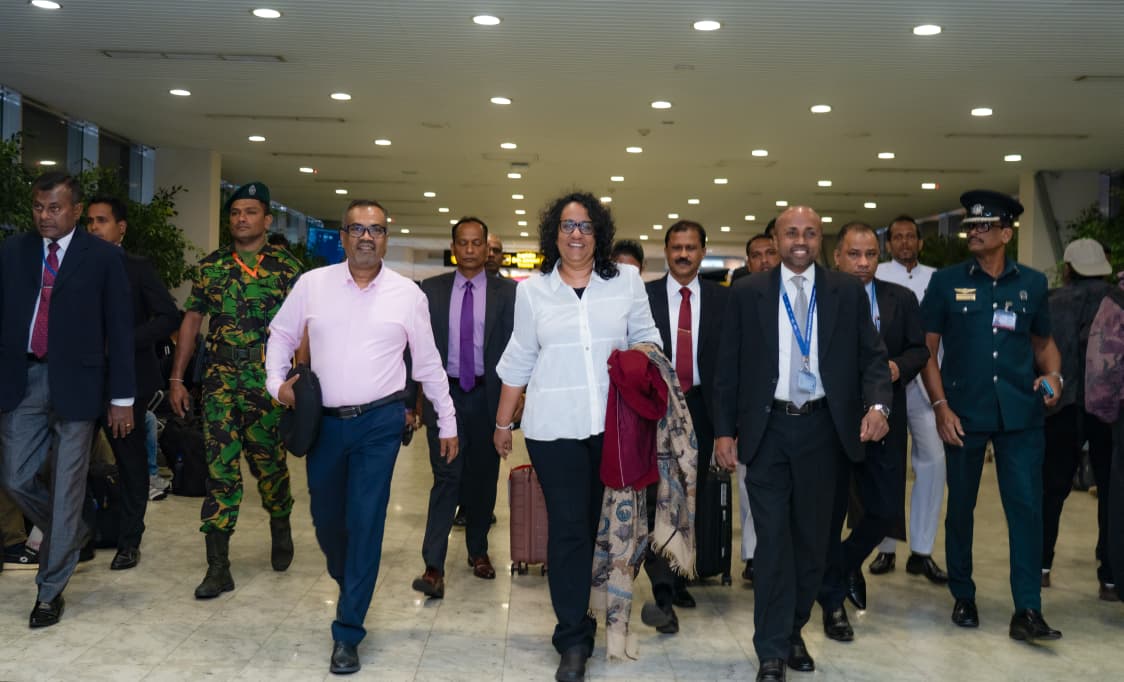
Prime Minister Dr. Harini Amarasuriya departed Sri Lanka on this morning (19 January) to participate in the 56th Annual Meeting of the World Economic Forum (WEF), to be held in Davos-Klosters, Switzerland, from 19 to 23 January 2026.
The World Economic Forum 2026 will be convened under the theme “A Spirit of Dialogue” and will bring together over 3,000 global leaders, including heads of state, government leaders, chief executive officers of leading multinational corporations, policymakers, and technology innovators.
During the visit, the Prime Minister is scheduled to hold a series of high-level bilateral meetings with key international leaders, heads of global institutions, and other distinguished dignitaries.
(Prime Minister’s Media Division)
News
Coal scandal: Govt. urged to release lab report
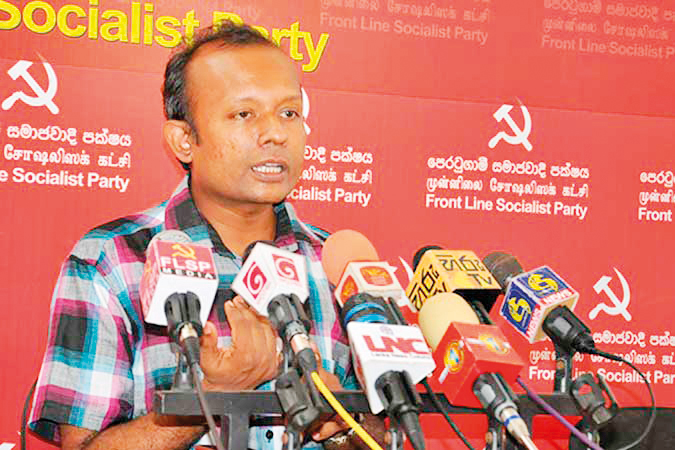
The government is under mounting pressure to release a foreign laboratory report on the controversial coal consignment imported for the Lakvijaya Power Plant, with the Frontline Socialist Party (FSP) accusing the authorities of political interference and tender manipulation.
Speaking to the media after a party meeting in Homagama yesterday, FSP Education Secretary Pubudu Jagoda demanded an immediate explanation for the delay in disclosing the report from a Dutch laboratory, Cotecna, which was commissioned to test samples of the coal stocks in question after doubts were raised about an earlier local laboratory assessment. Jagoda said Cabinet media spokesperson Dr. Nalinda Jayatissa had announced that the report would be submitted by 16 January, but it had yet to be made public.
“The Sri Lankan lab confirmed the coal was substandard and could damage both the environment and power plant machinery. The foreign lab has independently verified the same results, we are told. Yet, political pressure appears to be delaying the release of the report.” He warned that any attempt to issue a false report would eventually be exposed and urged the government and the laboratory to maintain transparency.
SLPP MP D.V. Chanaka told Parliament last week that while 107 metric tonnes of coal were normally required per hour to generate 300 megawatts, but as many as 120 tonnes of newly imported coal were needed to produce the same amount of power due to its lower calorific value. Tests showed the first two shipments had calorific values of 5,600–5,800 kcal/kg, below the required minimum of 5,900 kcal/kg, said.
Jagoda accused the government of tailoring procurement rules to benefit an Indian supplier, citing a drastic reduction in reserve requirements—from one million metric tonnes in 2021 to just 100,000 tonnes in 2025—and alleged previous irregularities by the company, including a 2016 Auditor General finding regarding a rice supply contract and the 2019 suspension of a key agent of the company by the International Cricket Council over match-fixing.
He further criticised systemic manipulation of the coal tender process, including delays in issuing the tender from the usual February-March window to July, and progressively shortening the submission period from six weeks to three, giving an advantage to suppliers with stock on hand.
The Ministry of Energy recently issued an amended tender for 4.5 million metric tonnes of coal for the 2025/26 and 2026/27 periods, following the cancellation of an earlier tender. Jagoda warned that procurement delays and irregularities could trigger coal shortages, higher spot-market purchases, increased electricity costs, and potential power cuts if hydropower falls short.
Jagoda called for urgent investigations into the procurement process, insisting that any mismanagement or corruption should not be passed on to the public.Denying any wrongdoing, the government has said it is waiting for the lab report.
by Saman Indrajith ✍️
News
Greenland dispute has compelled Europe to acknowledge US terrorising world with tariffs – CPSL
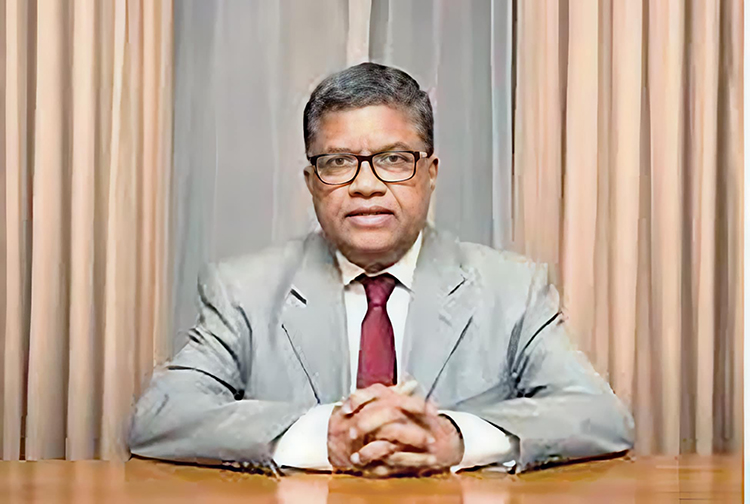
The Communist Party of Sri Lanka yesterday (18) alleged that the US was terrorising countries with unfair tariffs to compel them to align with its bigot policies.
CPSL General Secretary Dr. G. Weerasinghe said so responding to The Island query regarding European countries being threatened with fresh tariffs over their opposition to proposed US take-over of autonomous Danish territory Greenland.
US President Donald Trump has declared a 10% tariff on goods from Denmark, Norway, Sweden, France, Germany, the UK, the Netherlands and Finland with effect from 1 February but could later rise to 25% – and would last until a deal was reached. Targeted countries have condemned the US move.
Dr. Weerasinghe pointed out that none of the above-mentioned countries found fault with the US imposing taxes on countries doing trade with Russia and Iran. Now that they, too, had been targeted with similar US tactics, the CP official said, underscoring the pivotal importance of the world taking a stand against Trump’s behaviour.
Referring to the coverage of the Greenland developments, Dr. Weerasinghe said that news agencies quoted UK Prime Minister Keir Starmer as having said that the move was “completely wrong”, while French President Emmanuel Macron called it “unacceptable.
Dr. Weerasinghe said that Sri Lanka, still struggling to cope up with the post-Aragalaya economic crisis was also the target of discriminating US tariff policy. The top CPSL spokesman said that the recent US declaration of an immediate 25% increase in tariff on imports from countries doing business with Iran revealed the prejudiced nature of the US strategy. “Iran is one of our trading partners as well as the US. Threat of US tariffs on smaller countries is nothing but terrorism,” Dr. Weerasinghe said, stressing the urgent need for the issue at hand to be taken up at the UN.
Responding to another query, Dr. Weerasinghe cited the US targeting India over the latter’s trade with Russia as a case in point. He was commenting on the recent reports on India’s Reliance Industries and state-owned refiners sharply cutting crude oil imports from Russia. The CPSL official said that the EU wouldn’t have even bothered to examine the legitimacy of US tariff action if they hadn’t been targeted by the same action.
Perhaps, those who now complain of US threats over the dispute regarding Greenland’s future owed the world an explanation, Dr. Weerasinghe said. The reportage of the abduction of Venezuela’s President and the first lady underscored that the US intervened because it couldn’t bear the Maduro administration doing trade with China and other countries considered hostile to them, Dr. Weerasinghe said.
The CPSL official said that the NPP couldn’t turn a blind eye to what was happening. Just praising the US wouldn’t do Sri Lanka any good, he said, adding that the Greenland development underscored that the US under Trump was not concerned about the well-being of any other country but pursued an utterly one-sided strategy.
The US dealings with the NPP government, particularly the defence MoU should be examined taking into consideration US tariffs imposed on Sri Lanka at the onset of the second Trump administration and ongoing talks with the US, Dr. Weerasinghe.
By Shamindra Ferdinando ✍️
-

 Editorial2 days ago
Editorial2 days agoIllusory rule of law
-

 News3 days ago
News3 days agoUNDP’s assessment confirms widespread economic fallout from Cyclone Ditwah
-

 Business5 days ago
Business5 days agoKoaloo.Fi and Stredge forge strategic partnership to offer businesses sustainable supply chain solutions
-

 Editorial3 days ago
Editorial3 days agoCrime and cops
-

 Features2 days ago
Features2 days agoDaydreams on a winter’s day
-

 Editorial4 days ago
Editorial4 days agoThe Chakka Clash
-

 Features2 days ago
Features2 days agoSurprise move of both the Minister and myself from Agriculture to Education
-

 Features2 days ago
Features2 days agoThe Story of Furniture in Sri Lanka


